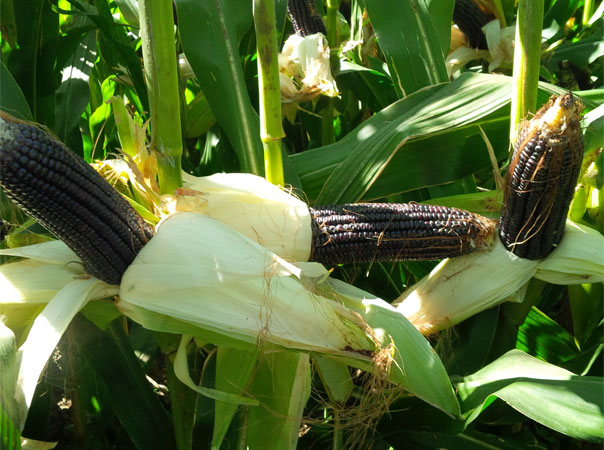Clark Specialty Grains creates link in non-GMO supply chain
By Ken Roseboro
Published: January 30, 2015
Category: Non-GMO Company Profiles

Clark Specialty Grains contracts farmers to grow organic and non-GMO blue corn, which is processed into tortilla chips
To access all the articles in this month's issue of The Organic & Non-GMO Report, SUBSCRIBE NOW.
Nebraska-based company supplies organic and non-GMO corn to tortilla chip manufacturers
The Non-GMO Project has seen tremendous growth with more than 22,000 products now non-GMO verified. Now that growth is extending down the supply chain to the farm. More suppliers of non-GMO and organic grains are getting their products verified, which is helping to build a “farm to fork” non-GMO supply chain.
One of those companies is Clark Specialty Grains, based in Gothenburg, Nebraska. Owner Jim Clark is a third-generation farmer with extensive experience growing and cleaning organic and non-GMO food-grade corn.
Clark lives in a region that is known for food-grade corn production. Gothenburg, which is in central Nebraska, is home to a Frito Lay corn receiving facility. Many farmers in the area grow and supply corn to Frito Lay, which processes the corn into tortilla chips. Clark also grew corn for Frito Lay.
“As a farmer I wanted to deliver the highest quality food-grade corn,” he says.
This commitment to quality led Clark to build a cleaning facility for his corn in 2000. His facility soon attracted more business.
“The saying goes ‘build it and they will come.’ I built this facility and soon I was cleaning my own corn and my neighbors’,” he says.
In 2003, a local organic farmer asked Clark if he would clean corn for him, which opened new horizons.
“That got me thinking about the possibilities of handling different varieties of corn,” he says.
His facility became certified organic and soon he was cleaning the majority of Frito Lay’s organic blue corn.
“Demand is running wild”
Clark Specialty Grains has continued to grow, and today their facility supplies 25 million pounds of organic and non-GMO white, blue, yellow, and, most recently, pink corn to tortilla chip manufacturers nationwide.
Clark contracts as many as 75 farmers in Nebraska and four surrounding states to grow the corn. He is continuing to add more farmers.
“Demand is running wild,” he says. “I can’t keep up with what the tortilla industry wants.”
The majority of the corn, 85 percent, is organic and the rest is non-GMO, though Clark sees future growth in non-GMO.
“We’re getting more calls for non-GMO. It will be our largest growth area over the next few years,” he says.
The two markets are polar opposites now. “Non-GMO has more growers than markets and organic has more markets than growers,” Clark says. “We’re desperately looking for organic growers.”
Non-GMO Project verification was natural fit
Many of Clark’s customers want corn that is both organic and verified non-GMO, which led him to seek Non-GMO Project verification.
“When the Project started, I was consulted as a corn expert and that sparked my interest in it. It was one step we hadn’t done, but it was the direction we’ve always been taking,” he says.
Clark’s farmers must follow steps to preserve the non-GMO identity of their corn from the seed to the cleaning facility.
Because he is a farmer, Clark understands the importance of working with each grower and helping to educate them on ways to maintain non-GMO identity. This is no easy task in an area that is dominated by GM corn, and cross pollination—and contamination—is always a threat.
“It comes down to an individual basis,” Clark says. “We get to understand the growers’ practices and educate them on what needs to take place. The farmer has to be successful in order for us and the tortilla chip manufacturers to be successful.”
For example, Clark will examine a farmer’s field to determine a contamination threat from neighboring fields.
“The last thing we would want to do is raise a crop surrounded by GMO corn,” he says.
One farmer has been able to schedule growing corn while two of his neighbors grow soybeans to avoid GMO contamination.
“Little practices like this can make a difference,” Clark says.
GMO testing in the field and at the facility
The Non-GMO Project standard requires testing and that is done starting in the field. Clark will test ears of corn in a farmers’ field using the lateral flow “strip” GMO tests. Testing in the field helps to avoid problems later.
Corn is also strip tested as it arrives at Clark’s facility. If the corn tests negative for GMOs, it is stored in a bin and samples are taken and sent to a laboratory for DNA-based PCR testing.
Clark has had to reject incoming semi-truckloads of corn, but only a few.
“We’ve handled about 6000 semi loads and had a really good success rate (in not having to reject loads)”, Clark says.
To date, Clark has had blue and yellow corn Non-GMO Project verified. His goal is to have all corn varieties—blue, white, yellow, and pink—all verified.
Regarding GMOs, Clark says he is not a “huge fan.”
“If I had young children and my wife was shopping for food, I would advise her to look for organic and non-GMO verified foods. I want to be part of a movement that gives choice to consumers about what they buy and eat,” he says.
Sounds like good common sense from a farmer in the heartland.
© Copyright The Organic & Non-GMO Report, February 2015




